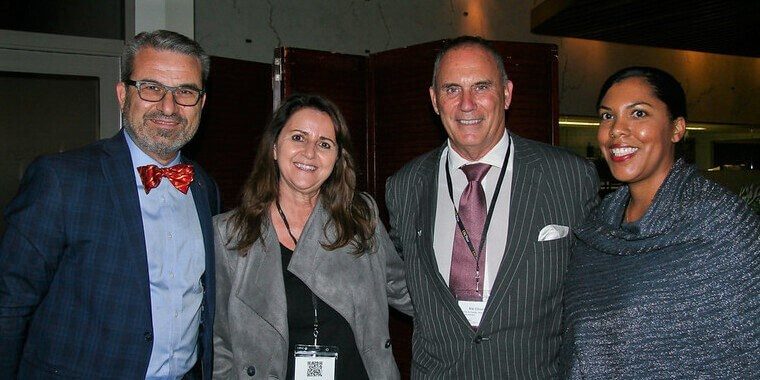When Riki Ellison, renowned Trojan linebacker, three-time Super Bowl champion and expert in missile defense, approached USC Viterbi Dean Yannis Yortsos in early 2021 with a proposal for a new certificate program, the idea for one of the university’s most innovative partnerships was born.
Less than a year later, that partnership — between Ellison’s Missile Defense Advocacy Alliance (MDAA), the USC Viterbi School of Engineering and the USC Sol Price School of Public Policy — is in full swing.
By June 2021, Yortsos, Ellison, and USC Price Dean Dana Goldman had signed a memorandum of understanding, officially certifying the brand-new Executive Program in Global Space and Defense. A year-long executive education program for military personnel and civilians working in defense policy, the program hopes to offer a holistic approach to current grand challenges in the defense realm through interdisciplinary study.
Classes begun virtually in Fall 2021. By November, students had arrived on campus.
On November 18, 2021, students had their first day of in-person classes led by Neil Siegel, USC Viterbi’s IBM Professor of Engineering Management, and a guest speaker, Lt. Gen. Michael A. Guetlein, during lunch. The day culminated with a welcome reception where students could mingle with their professors and leadership from MDAA and USC, as well as undergraduates in the USC ROTC program.
“It’s great to finally see everyone in person,” said Ellison, a 1983 USC graduate in international relations with an emphasis on defense and strategic studies. “As experts say, so much of communication is body language. It was so much easier to see how focused, engaged and excited everyone was.”
The week marked an important occasion for the program participants. After completing a few weeks of coursework, they were divided into research groups and chose their area of focus. The projects, which will be presented in April 2021, delve into a contemporary political issue in the field of American defense.
“It is a fortuitous time for this program,” said Victorino Mercado, MDAA’s academic innovation liaison to the project and the former U.S. assistant secretary of defense for strategy, plans and capabilities.
“We have a new administration in the White House,” he explained. “Laws stay the same after such a transition, but policy begins anew. There is much room for innovation in new policy creation.”
The executive program hopes to chart new waters in this vast sea of opportunity. Students from vastly different fields and lived experiences can work together to tackle never-before-seen problems.
“Space is an unknown frontier in terms of policy,” commented Frank Zerunyan, USC Price professor of the practice of governance, director of executive education programs and director and university liaison to ROTC programs. “Specifically, there is no American policy in place about how to react to flying a hypersonic missile around the world.”
Students in the program are excited to immerse themselves in studying problems they tackle every day in their professional life.
“We literally do rocket science,” said Barbara Baker, an engineer at the Los Angeles Air Force Base who enrolled in the inaugural class of the program.
“At my job, military and civilians work together every day to face “The Threat” — whatever the most dangerous thing to American safety might be that day. It’s the common denominator that helps bring policy people and engineers together.”
The program’s administration hopes that the collaborative environment will encourage innovative research and continued conversation that reshapes the world of defense policy as we know it today.
“This program fosters a much needed conversation between policymakers and the engineers that innovate and create the technologies used in global space and defense,” said Candace House Teixeira, USC Viterbi associate dean of corporate engagement and programs. “Effective policy should integrate an understanding of current and future developments in engineering.”
“It will fundamentally alter how our engineering impacts the globe and enables us to imagine a safer, more peaceful world for all.”

